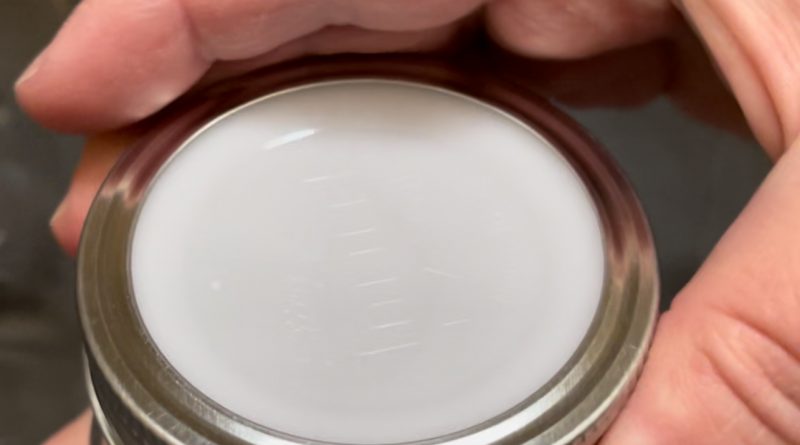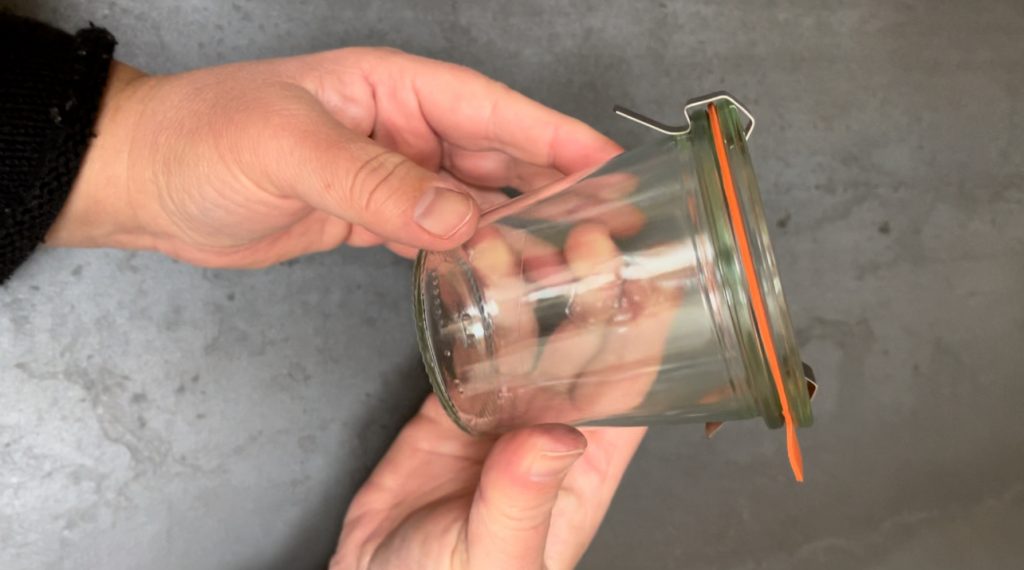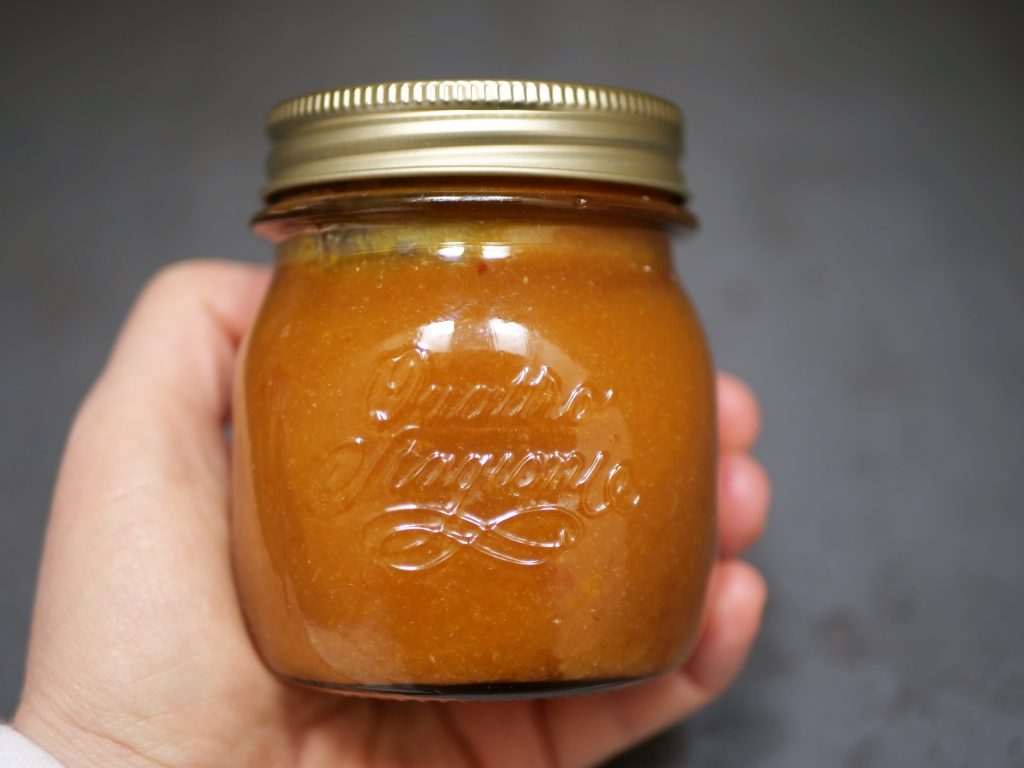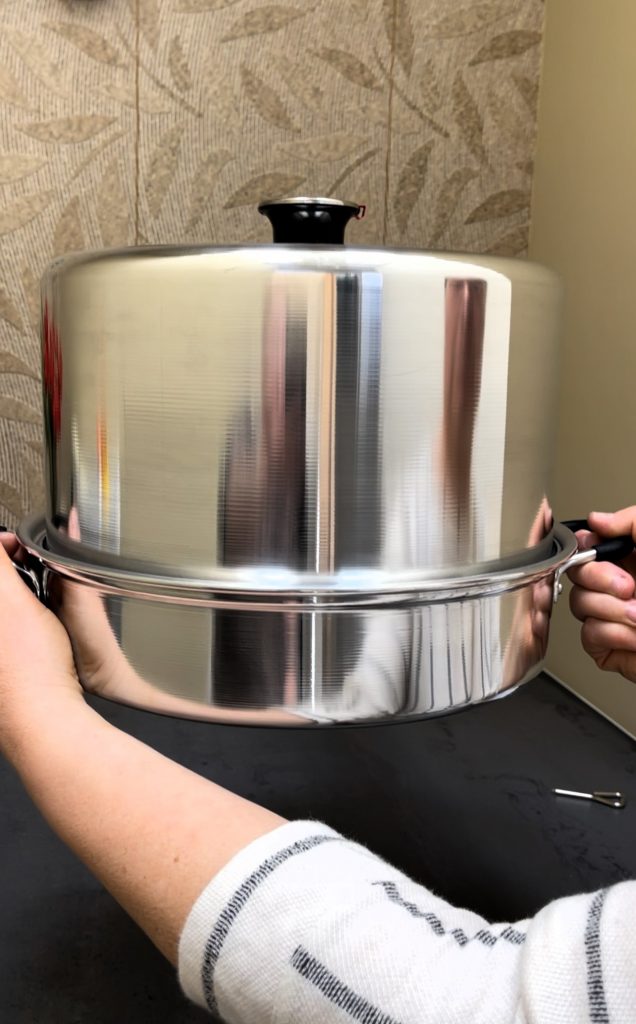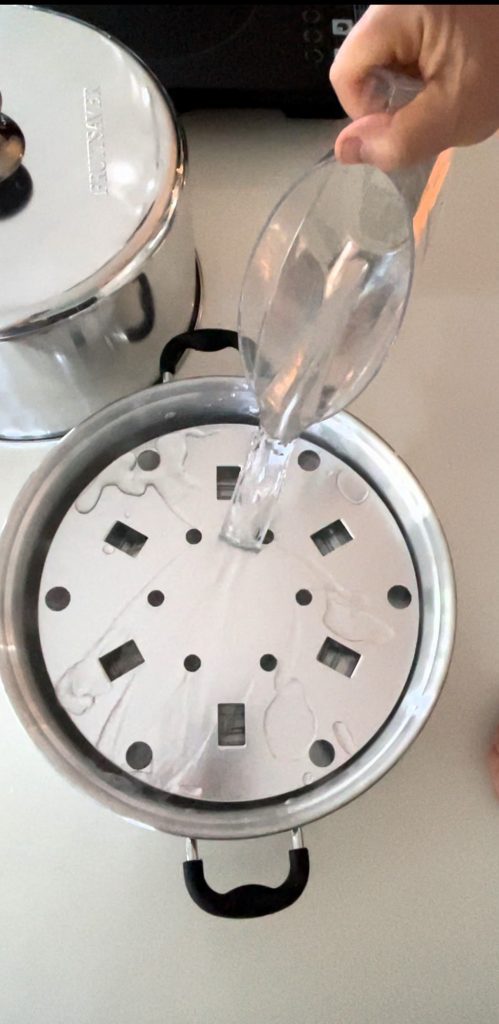How To Use Tattler Reusable Lids And Rings For Home Canning
Views: 327
In one of our past posts, we discussed different single-use and reusable canning lids, briefly mentioning both Tattler reusable lids and their single-use metal counterparts. With a growing interest in sustainability and reducing disposable items, we thought it was important to take a closer look at Tattler reusable lids.
We bought the lids described in this article with our own money. This is not a sponsored post, but rather our honest opinion of Tattler reusable lids and rings.
Why reusable lids and why Tattler?
We are two sisters with a background in technology and medicine. That conditioned us to always prioritize the wholesomeness and safety of the food we eat and the functionality and safety of the tools we use in our kitchen. We hate waste, so we always look for things that we can use more than once. Coming from a large Ukrainian family, we have learned the value of being thrifty, regardless of our financial situation.
We got curious about Tattler lids because they seemed to match everything we care about. So, we bought two packs of Tattler reusable lids to try them out ourselves.
We became interested in reusable lids because they seemed to align perfectly with our values. Right now, there are two companies manufacturing and selling reusable lids – Tattler and Harvest Guard. At first glance, they seem pretty similar. But since Tattler has been making reusable canning lids since 1976, we figured they’ve probably fixed any issues with their product by now.
Unpacking Tattler reusable canning lids
If you’ve only ever used single-use canning lids, trying out Tattler reusable canning lids will be a whole new experience. Unlike the single-use single-piece snap lids commonly used in most Mason jars, Tattler’s lids come in two parts: a snap lid and a gasket. The material used to make reusable lids is also different. Instead of metal used in single-use canning lids, Tattler makes their reusable lids with BPA-free plastic. The gasket, which provides the seal, is made of rubber.
When you unbox your Tattler lids, you’ll get a set of plastic lids (regular or wide mouth) and matching rubber gaskets. The package also includes clear instructions on how to use these reusable lids for canning. Before you start canning with them, you’ll need to attach one of the provided gaskets to each lid. It’s a straightforward process. So straightforward that even a three-year-old could do it without a problem.
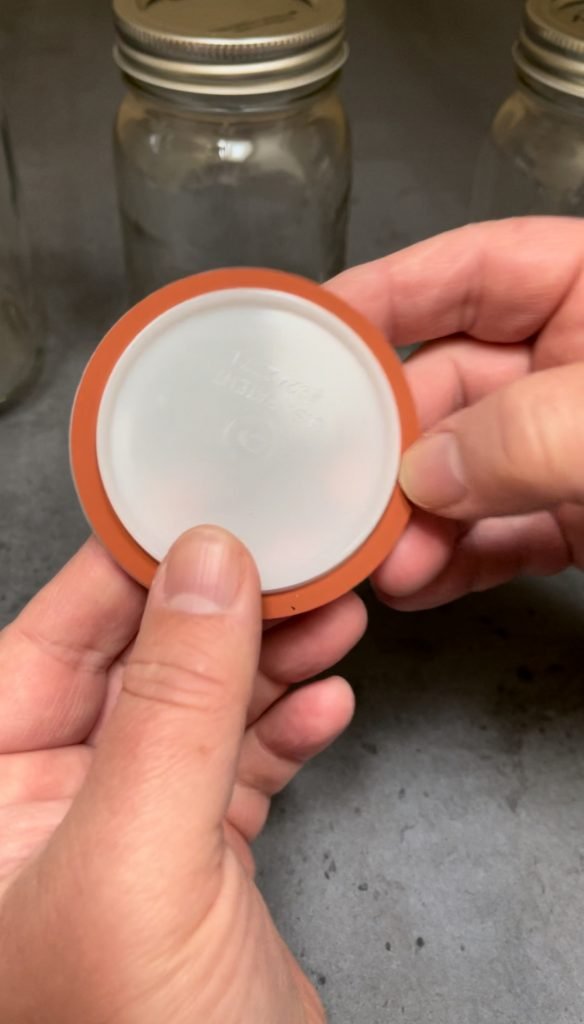
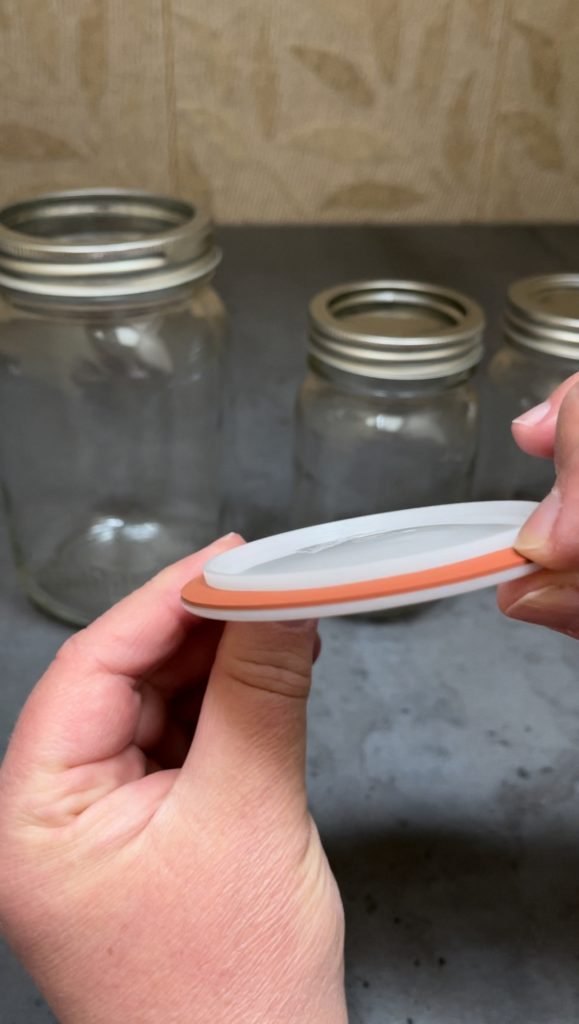
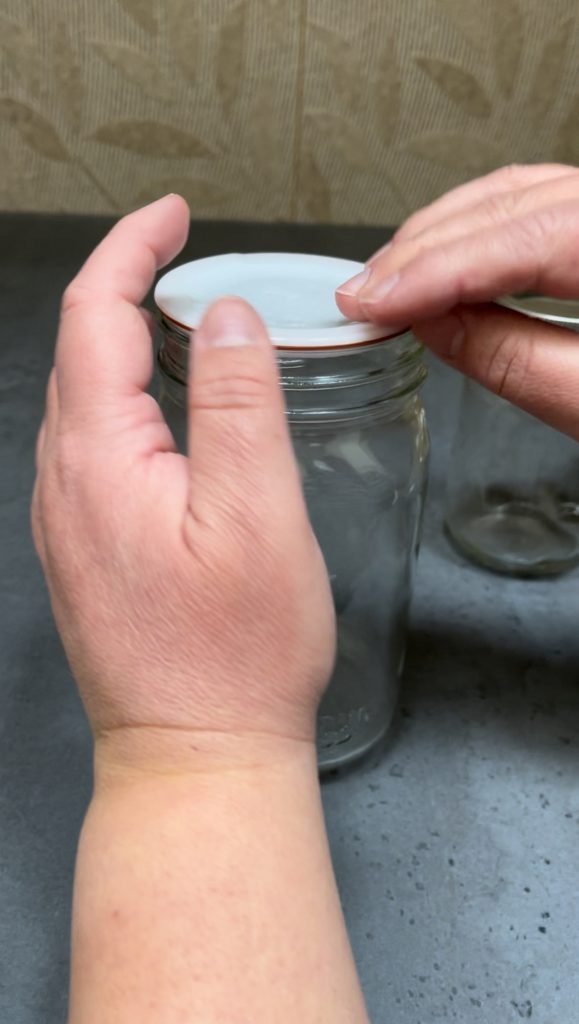
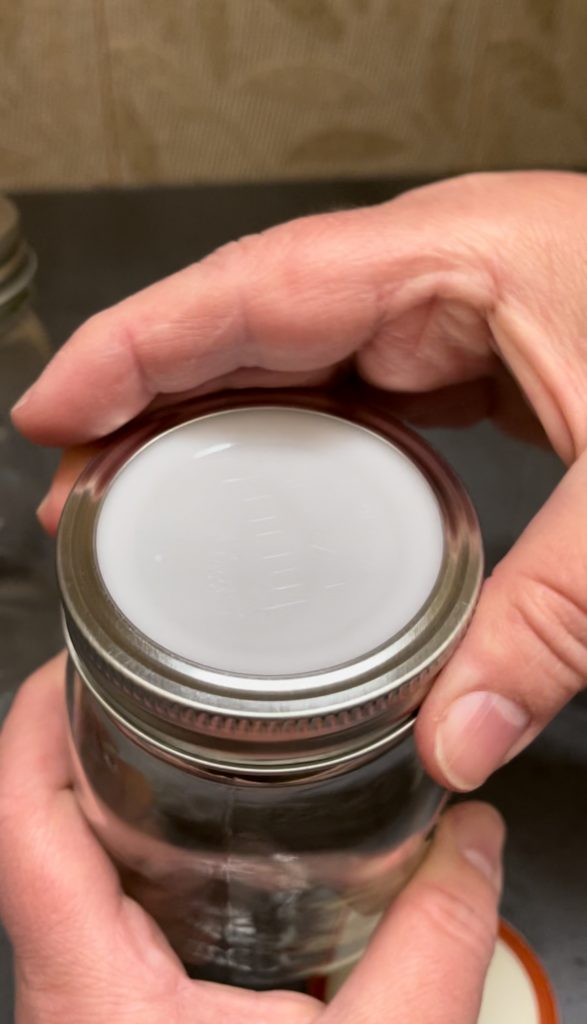
It’s worth noting that when you buy Tattler lids, they don’t come with the metal bands used to secure the lids on jars. This isn’t a problem because Tattler designed their lids for use with the same metal bands you already use for single-use snap lids.
Price difference between single use and Tattler reusable canning lids
For those of us who are price-conscious and thrifty, the burning question is often about cost: How much do these lids cost, and how does that compare to the price of single-use metal snap lids? Well, we’ve done the research, and we’re happy to share our findings with you.
Let’s break it down:
- If you buy single-use metal snap lids from such well-known made-in-America brands like Ball, Kerr, or Bernardin, this is what your cost will be:
- If buying in smaller quantities, like a two-pack of 12, you’re looking at around $0.61 per regular to $0.66 per wide-mouth lid options.
- If buying in larger quantities, say a six-pack of 12, brings the cost down to about $0.38 per regular to $0.44 per wide mouth lid.
- On the other hand, if you choose single-use, no-name, or unknown brand metal snap lids, all mostly made in China, the price is significantly lower, ranging from $.21 to $.10 per lid for large orders. Interestingly, the price doesn’t vary between regular and wide-mouth lids but does decrease significantly for larger quantities.
- In contrast, if you decide to buy Tattler reusable lids, expect to pay $.82 per regular mouth lid and $.91 per wide mouth lid. The price drops as you buy larger quantities, such as 100 lids, to $.71 per regular mouth lid and $ .81 per wide mouth lid.
Sure, it might seem like a substantial difference at first glance. However, remember that Tattler lids are reusable—meaning you can use them multiple times. That changes the game entirely! For example, if you’re a frequent canner who typically uses the USA-made brand name single-use lids and switch to Tattler, after just two uses of the Tattler reusable lids, your cost evens out. After that, it’s like canning with free lids.
With the no-name, made-in-China bulk single-use canning lids, you’ll break even after using Tattler reusable lids between 4 to 7 times.
In essence, the more you reuse Tattler lids, the more cost-effective they become.
Are reusable canning lids safe?
If you’re a regular reader of our canning blog, you’ll know we’re not big fans of plastic. We usually advise against using it for food preservation due to worries about chemicals contained in the plastic seeping into the food, especially when the canned food is high in fat or has alcohol.
Although we’re enthusiastic about the concept and reusability of Tattler lids, we wish Tattler made them of a different material. However, to be fair to Tattler, their lids are BPA-free and utilize food-grade approved plastic compound known as Polyoxymethylene Copolymer (POM) or Acetal Copolymer. While Acetal Copolymer is known to contain traces of formaldehyde, unless you are planning to bring your canner’s temperature to over 460°F, this should be the last of your concerns.
Where to buy Tattler reusable canning lids and rings?
You can buy Tattler reusable lids and rings directly from their website. Additionally, you can buy these reusable lids and rings from online retailers, like Amazon, specialty kitchenware stores, and sometimes even big supermarkets. In Canada, we used to be able to find the rubber gaskets for these lids at Canadian Tire.
How to can with Tattler reusable lids
Tattler reusable canning lids work a lot like the regular one-piece metal lids you use for Mason jars, but there are a few important things to know.
Here’s a greatly simplified rundown of how they work:
- First, you attach a rubber gasket to a canning lid and soak it in hot water while you prepare your jar.
- Fill your jar with food, leaving the required headspace, and wipe the jar rim clean.
- Place the lid with the gasket on the jar and secure it as you would with a regular lid, but don’t tighten it too much. Once the jar starts to spin as you tighten the band, you need to stop.
- Process your jar using your usual canning method.
- After processing, wait 5 minutes, then tighten the lid with a metal band using a towel for grip.
- Let the jar cool, remove the metal band, and check the seal with a lift test before storing it away.
As always, the devil is in the details, and we’ve got firsthand tips and tricks to share to help you navigate any potential challenges.
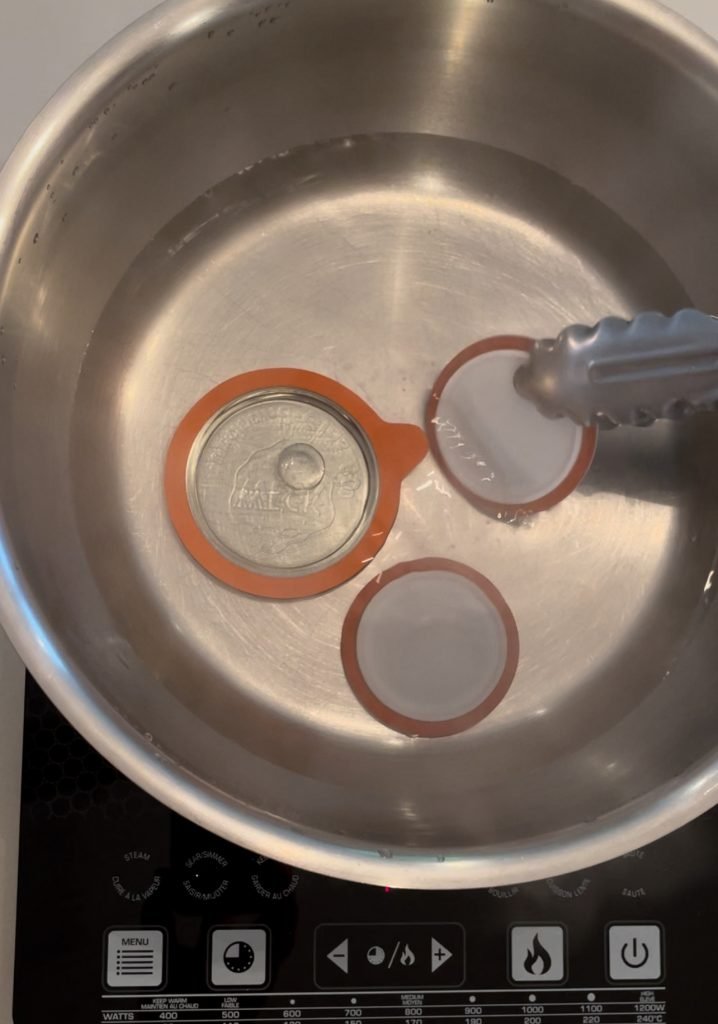
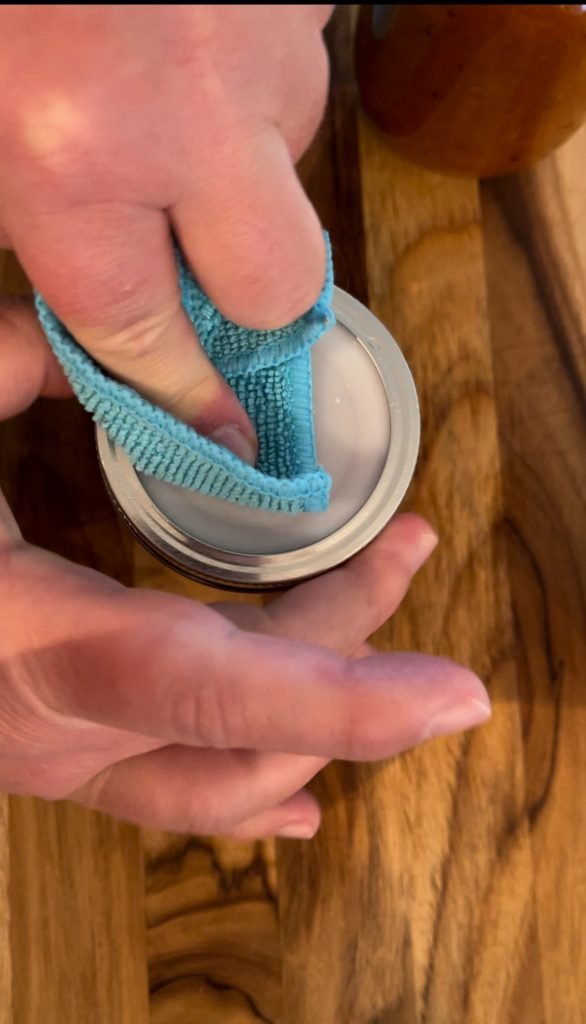
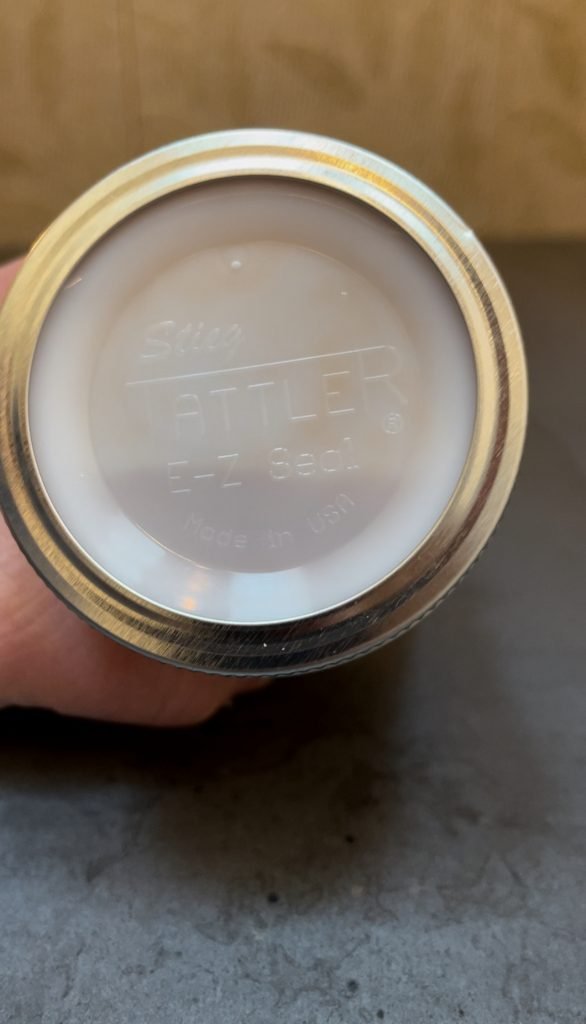
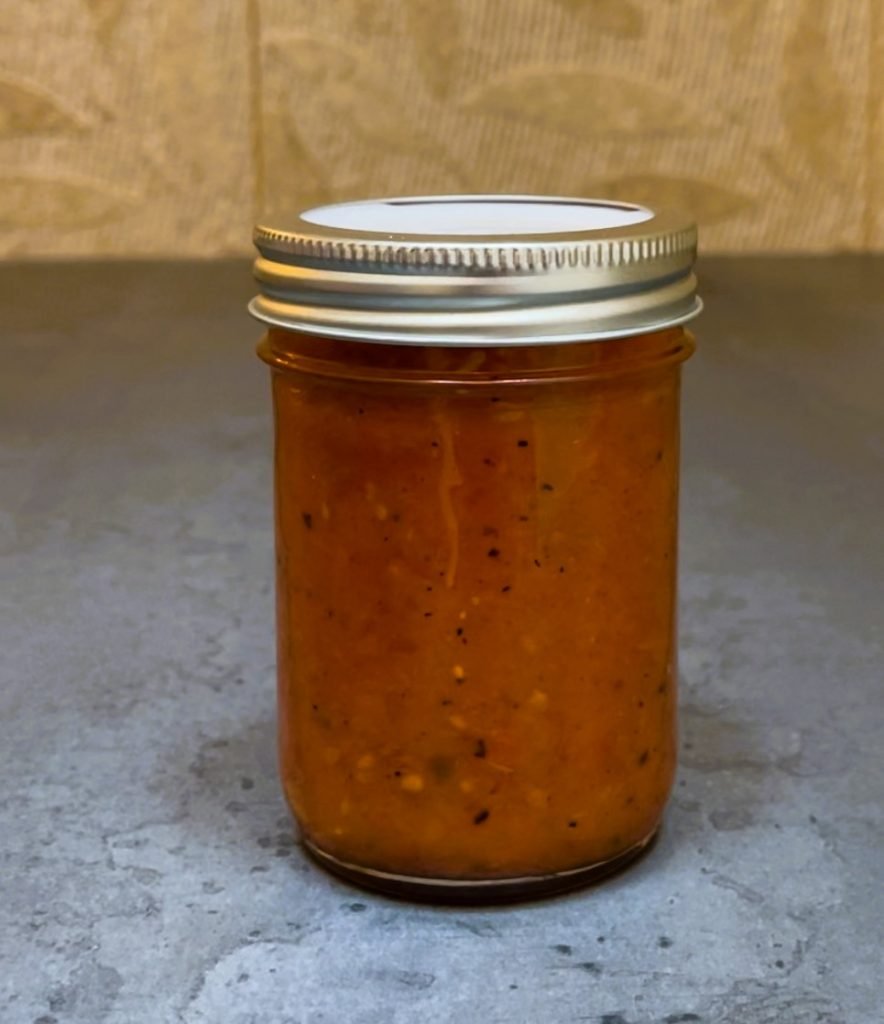
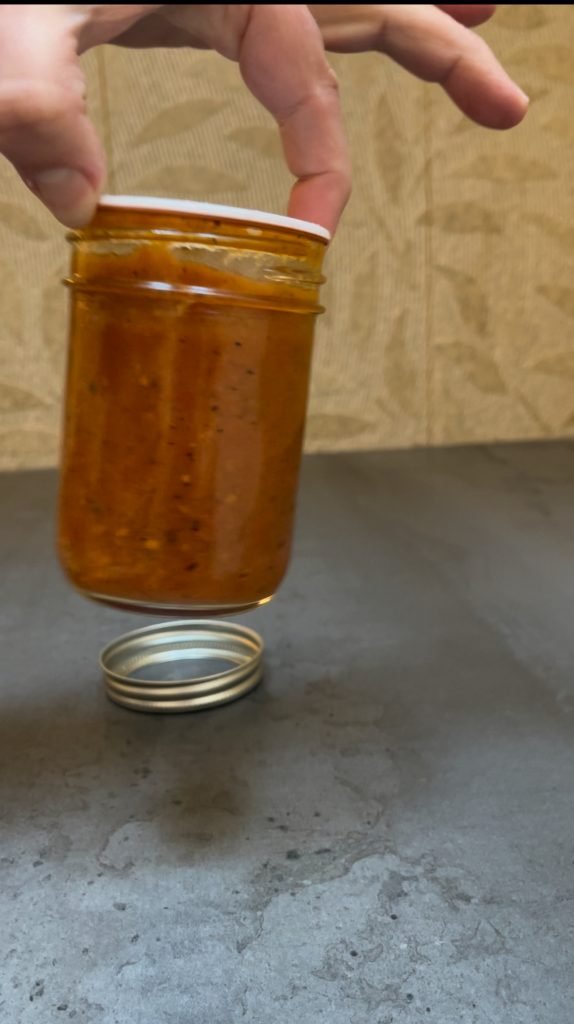
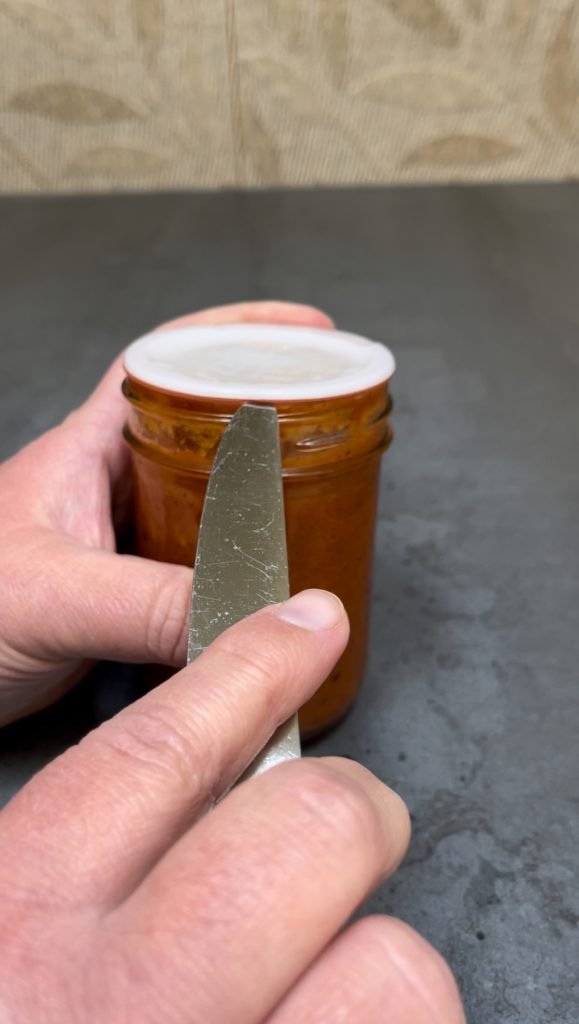
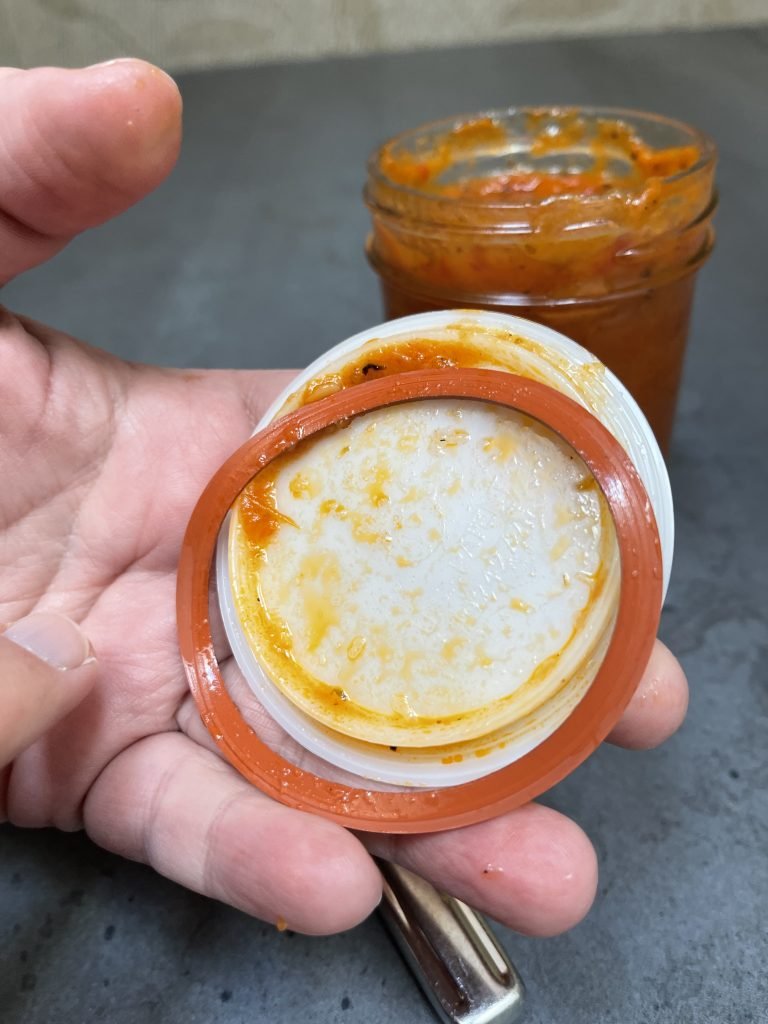
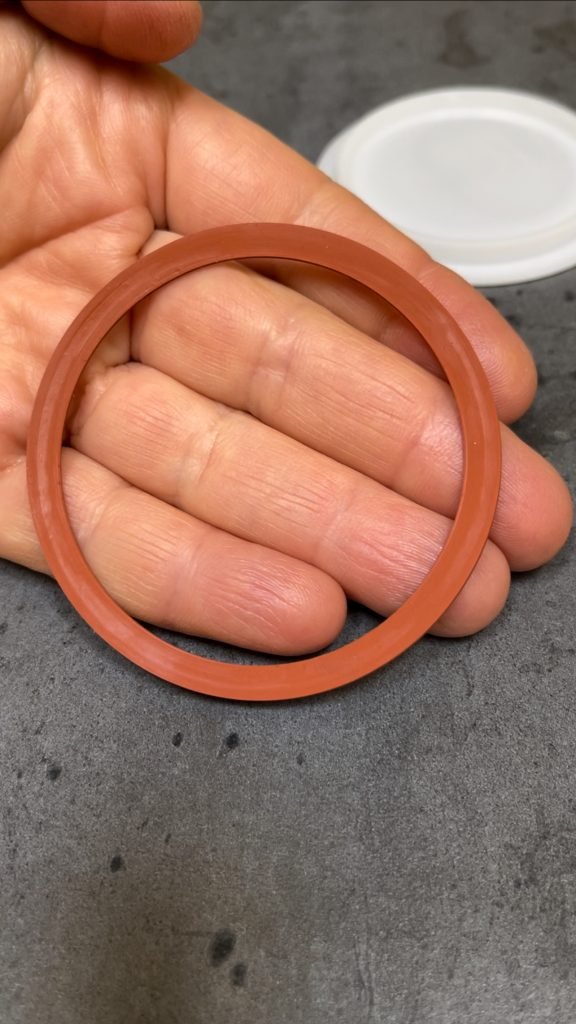
Reusing Tattler canning lids and rings
Firstly, Tattler lids are safe for both boiling water baths and pressure canners. So, don’t worry about using these plastic lids on your jars, even if you plan to keep them in the boiling water bath for more than 50 minutes.
After opening a jar of tomato sauce that we had previously processed for 45-minute in a boiling water bath, we found that both the reusable lid and the rubber gasket were in a great shape and ready to be used again. Specifically, we noticed that plastic lid didn’t change at all. The rubber gasket turned a deeper brick color. Additionally it showed some groove marks on the side that touched the jar’s mouth.
Here’s a helpful tip: when reusing the rubber gaskets, flip them over to the smoother side to ensure a solid seal. And remember, avoid using anything sharp to open the plastic lids, as it could cause damage. Tattler recommends using a butter knife, which works well for us. Just be sure to slide it under the rubber gasket, and then gently lift the lid. Do not put the knife between the lid and the rubber gasket. Doing so will damage the plastic lid.
How to check if your reusable lids have sealed your jar
Unlike single-use metal snap lids, Tattler reusable lids don’t have a button that pops down when the jar is sealed. So, how do you go about testing the seal? it is quite simple, really. To check the seal on your jars, hold the jar by the lid’s top and lift it carefully. If any part of the lid moves, your jar isn’t sealed.
We should note that these reusable lids don’t have a safety button like you’re used to with metal lids. However, when you take the jar out of the canner, you’ll notice the center of the lid forming a bit of a dome. As the jar cools, this dome settles and gets depressed, similar to how the safety button works on single-use jars.
How to lift reusable lids and rings from the boiling hot water
Because Tattler makes these lids with plastic, you won’t be able to use a magnetic jar lid lifter to pull them from the hot water. Instead, you should use a pair of kitchen tongs. Carefully grip the edge of the lid with the tongs. Ensuring you have a secure hold, and lift the lid with a band attached out of the water.
How not to over tighten the screw band on Tattler reusable lids
We found this tip on the Tattler website, and it worked great for us. Here’s how to make sure you do not over tighten the screw band:
Start by screwing a band onto the jar. When you feel the band starting to resist, don’t hold the jar by its body. Instead, place your index finger on top of the lid and try to tighten the band further. If the jar starts spinning under your finger, you’re done. If not, keep tightening until it does.
Reusable canning lids and open kettle canning method
For anyone curious about using Tattler reusable lids with the open kettle canning method, we’ve got you covered. We tested these lids with a batch of jams, and we achieved a good seal on all our jars. The trick is to use a hot pack and invert the jars, letting them cool under a warm towel. However, it’s important to note that USDA does not approve this canning method.
Using reusable canning lids in atmospheric steam canners
Despite extensive research, atmospheric steam canning remains a canning method that the USDA does not recognize. However, if you prefer steam canning, like we do, and want to use Tattler’s reusable lids, you should know that we never had even one failed seal. The experience is similar to how they work with boiling water bath canning. You’ll even notice the same heat dome forming in the center of the lid, followed by the dome getting depressed, which is identical to what we have observed with boiling water bath canning.
Conclusion
To wrap it up, we’re big fans of the inexpensive reusable canning lid idea pioneered by Tattler. We also like with how well the Tattler reusable lids work. However, we’re not completely sold on plastic as the best material for canning lids. Looking ahead, we’re hopeful that Tattler will consider making their metal single-use lids reusable. Or, who knows, maybe they’ll even introduce glass lids, just like Ball did back in the early 60s. Wouldn’t that be something?
Canning Equipment We Reviewed:
*Note: We purchased all the items reviewed with our own money. These posts are not sponsored; they reflect our honest opinions on jars, lids, and other canning supplies we use.

